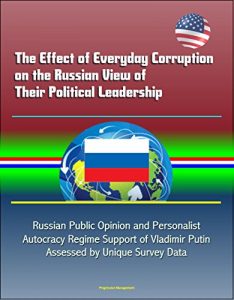This report has been professionally converted for accurate flowing-text e-book format reproduction. Analyzing unique survey data gathered in the summer of 2015 from Russia, the authors are able to trace the links between personal corrupt behavior and political attitudes. They show that participation in everyday corruption lowers a person's support for the political regime, both as a bivariate relationship and in a multivariate model with controls. Everyday interactions that citizens have with bureaucrats help form those citizens' views about something far removed from most citizens' lives: the country's political leadership. In Russia, those who frequently encounter corruption are less, not more, happy with the regime. Street-level corruption is corrosive of the body politic. These results, thus, are an important step towards resolving a long-standing debate among those who study corruption.
To the extent that Russian President Vladimir Putin heads a highly personalized authoritarian political regime, understanding why Russians give or withhold their approval for him and his lieutenants is revealing of the stability of the regime. Debate therefore continues about the sources of Russians' support for their political leaders, particularly Putin's high job-approval ratings. Strong empirical evidence shows that, at least until recently, the state of Russia's national economy pushed leadership approval up or down, as it does in most countries. At present, though, oil prices have collapsed, wage arrears have recommenced, inflation is high, pensions endangered, and many desired goods are unavailable, yet approval ratings are declining only somewhat if at all. To some observers, public approval is "sticky" due to the regime's smart use of Russian identity symbols via Kremlin-controlled media. Most critically over the past several years, the 2014 annexation of Crimea played to Russians' imperial nostalgia and longing to be a great power. This "Russians are hoodwinked" explanation, though, is certainly overstated and is unlikely to be useful beyond a limited period.
To the extent that Russian President Vladimir Putin heads a highly personalized authoritarian political regime, understanding why Russians give or withhold their approval for him and his lieutenants is revealing of the stability of the regime. Debate therefore continues about the sources of Russians' support for their political leaders, particularly Putin's high job-approval ratings. Strong empirical evidence shows that, at least until recently, the state of Russia's national economy pushed leadership approval up or down, as it does in most countries. At present, though, oil prices have collapsed, wage arrears have recommenced, inflation is high, pensions endangered, and many desired goods are unavailable, yet approval ratings are declining only somewhat if at all. To some observers, public approval is "sticky" due to the regime's smart use of Russian identity symbols via Kremlin-controlled media. Most critically over the past several years, the 2014 annexation of Crimea played to Russians' imperial nostalgia and longing to be a great power. This "Russians are hoodwinked" explanation, though, is certainly overstated and is unlikely to be useful beyond a limited period.












